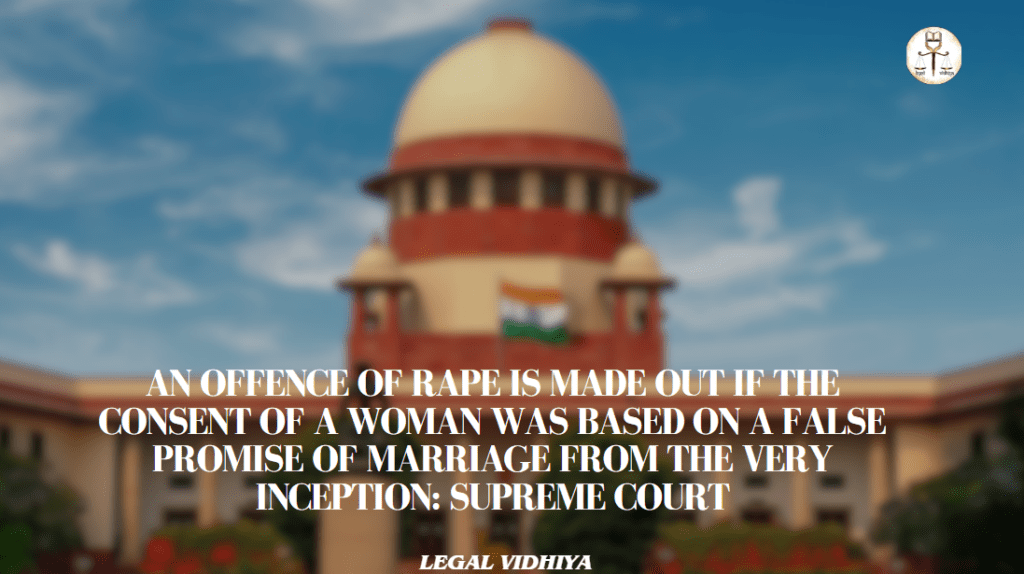
In a recent ruling the honorable Supreme Court ruled out that it must be established that from the very inception, the consent of the victim is a result of a false promise to marry, it will be considered as no consent and in such a case offence of rape will be made out.
The bench comprising Justice Abhay S. Oka and Justice Pankaj Mithal observed the said quoting from the judgment in Anurag Soni v. State of Chhattisgarh (2019) 13 SCC 1 and allowed the appeal. The question concerning the appeal filed was whether a case for quashing the criminal proceeding was made out or not.
As per the facts of the case, the appellant, i.e., the man proposed the second respondent i.e., the woman after which they maintained a physical relationship (from years 2013 to 2017) on the pretext that the appellant would marry the second respondent. In July 2017, there was even an engagement between both of them and in December 2017 when the second respondent realized she was pregnant, the appellant assured her that they’ll marry very soon. However, in 2018, the woman saw some photographs of an engagement ceremony of the man with another woman and thereby filed an FIR on misconception caused by false promise of marriage. However, the appellant claimed that he already married the woman in 2017 in a nikah and also had a copy of ‘Nikahnama’ and that even his passport bears the name of the woman as his wife.
As held by this Court in the case of Anurag Soni1, if the consent of the victim is based on misconception, such consent is immaterial as it is not a voluntary consent. If it is established that from the inception, the consent by the victim is a result of a false promise to marry, there will be no consent, and in such a case, the offence of rape will be made out.
The hon’ble court observed that to attract the provisions of Section 375 of the IPC, if the victim of the alleged offence of rape is not less than 18 years of age, then maintaining a sexual relationship with her due consent will not constitute an offence. In the said case, her year of birth was recorded as 1994 and was admittedly more than 18 years old when the relationship commenced. She never made any grievance or objected to the relationship for an entire period of 4 years, and in fact, there was even an engagement ceremony between her and the appellant. Therefore, it’s impossible to accept that she allowed such a physical relationship to be maintained from 2013 to 2017 based on a false promise to marry.
In regard to the Nikahnama, as the original one could not be produced, however, a carbon copy of the same was seized and produced and the statement of one Burhanuddin who was present at the time of Nikah, was recorded by the police. He confirmed the fact of the performance of Nikah between the appellant and the second respondent.
The court observed that the relationship between the second respondent and the appellant was consensual, as the former even admitted their engagement. She accepted the appellant’s proposal in 2011 and their engagement in 2017. Despite participating in the ceremony without any protest, she denied the fact that her marriage was solemnized with the appellant.
Thus the court held that by accepting the prosecution’s version, it’s implausible that the woman engaged in a physical relationship solely due to a promise of marriage and hence continuing the case would abuse the legal process, serving no purpose.
The impugned judgment and order passed in 2021 was quashed and set aside and the complaint filed in 2018, the charge sheet filed based on the same and any further proceedings of the case were quashed.
CASE NAME: Sheikh Arif vs. The State of Maharashtra & Anr.
NAME: RIDDHI GUPTA, COURSE: BALLB, COLLEGE: VIVEKANANDA INSTITUTE OF PROFESSIONAL STUDIES, INTERN UNDER LEGAL VIDHIYA
Disclaimer: The materials provided herein are intended solely for informational purposes. Accessing or using the site or the materials does not establish an attorney-client relationship. The information presented on this site is not to be construed as legal or professional advice, and it should not be relied upon for such purposes or used as a substitute for advice from a licensed attorney in your state. Additionally, the viewpoint presented by the author is of a personal nature.




0 Comments